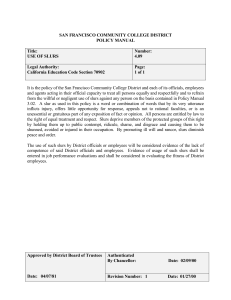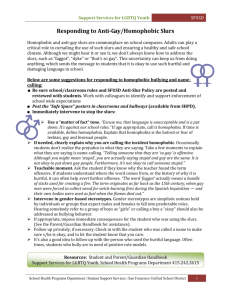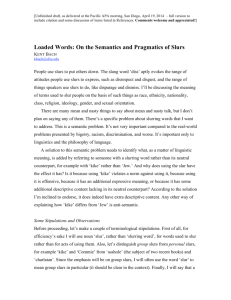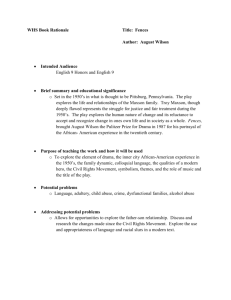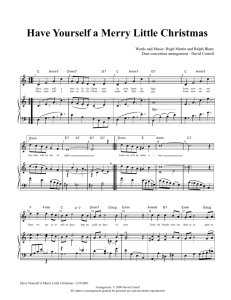On the Semantics and Pragmatics of Slurs
advertisement
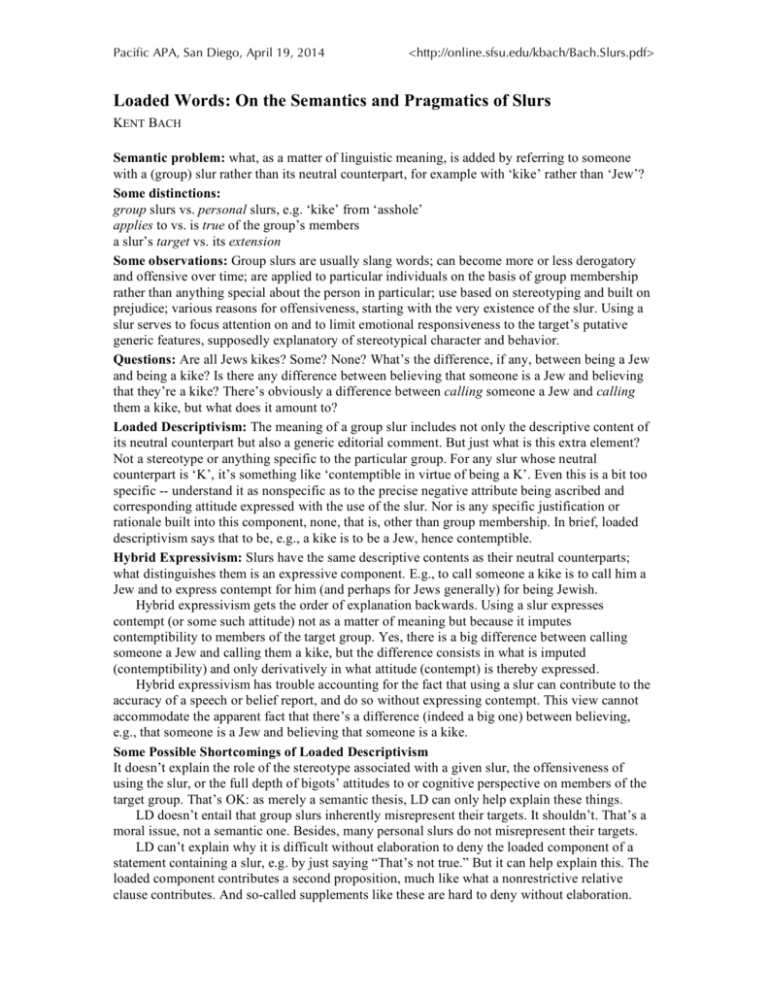
Pacific APA, San Diego, April 19, 2014 <http://online.sfsu.edu/kbach/Bach.Slurs.pdf> Loaded Words: On the Semantics and Pragmatics of Slurs KENT BACH Semantic problem: what, as a matter of linguistic meaning, is added by referring to someone with a (group) slur rather than its neutral counterpart, for example with ‘kike’ rather than ‘Jew’? Some distinctions: group slurs vs. personal slurs, e.g. ‘kike’ from ‘asshole’ applies to vs. is true of the group’s members a slur’s target vs. its extension Some observations: Group slurs are usually slang words; can become more or less derogatory and offensive over time; are applied to particular individuals on the basis of group membership rather than anything special about the person in particular; use based on stereotyping and built on prejudice; various reasons for offensiveness, starting with the very existence of the slur. Using a slur serves to focus attention on and to limit emotional responsiveness to the target’s putative generic features, supposedly explanatory of stereotypical character and behavior. Questions: Are all Jews kikes? Some? None? What’s the difference, if any, between being a Jew and being a kike? Is there any difference between believing that someone is a Jew and believing that they’re a kike? There’s obviously a difference between calling someone a Jew and calling them a kike, but what does it amount to? Loaded Descriptivism: The meaning of a group slur includes not only the descriptive content of its neutral counterpart but also a generic editorial comment. But just what is this extra element? Not a stereotype or anything specific to the particular group. For any slur whose neutral counterpart is ‘K’, it’s something like ‘contemptible in virtue of being a K’. Even this is a bit too specific -- understand it as nonspecific as to the precise negative attribute being ascribed and corresponding attitude expressed with the use of the slur. Nor is any specific justification or rationale built into this component, none, that is, other than group membership. In brief, loaded descriptivism says that to be, e.g., a kike is to be a Jew, hence contemptible. Hybrid Expressivism: Slurs have the same descriptive contents as their neutral counterparts; what distinguishes them is an expressive component. E.g., to call someone a kike is to call him a Jew and to express contempt for him (and perhaps for Jews generally) for being Jewish. Hybrid expressivism gets the order of explanation backwards. Using a slur expresses contempt (or some such attitude) not as a matter of meaning but because it imputes contemptibility to members of the target group. Yes, there is a big difference between calling someone a Jew and calling them a kike, but the difference consists in what is imputed (contemptibility) and only derivatively in what attitude (contempt) is thereby expressed. Hybrid expressivism has trouble accounting for the fact that using a slur can contribute to the accuracy of a speech or belief report, and do so without expressing contempt. This view cannot accommodate the apparent fact that there’s a difference (indeed a big one) between believing, e.g., that someone is a Jew and believing that someone is a kike. Some Possible Shortcomings of Loaded Descriptivism It doesn’t explain the role of the stereotype associated with a given slur, the offensiveness of using the slur, or the full depth of bigots’ attitudes to or cognitive perspective on members of the target group. That’s OK: as merely a semantic thesis, LD can only help explain these things. LD doesn’t entail that group slurs inherently misrepresent their targets. It shouldn’t. That’s a moral issue, not a semantic one. Besides, many personal slurs do not misrepresent their targets. LD can’t explain why it is difficult without elaboration to deny the loaded component of a statement containing a slur, e.g. by just saying “That’s not true.” But it can help explain this. The loaded component contributes a second proposition, much like what a nonrestrictive relative clause contributes. And so-called supplements like these are hard to deny without elaboration. A Sampler of Slurs Group > ethnic & racial beaner, camel jockey, chink, coon, cracker, dago, frog, gook, goy, greaser, gringo, half-breed, haole, heeb, honky, hymie, injun, jap, jigaboo, kike, kraut, limey, macaca, mick, nigger, nip, paleface, pickaninny, polack, russki, sand nigger, shiksa, spic, wetback, whitey, wop, yankee, yid Group > religious bible thumper, Jesus freak, holy roller, mackerel snapper, kike, raghead, clamhead, heathen, infidel Group > political commie, radical, leftie, right winger, reactionary, tea bagger, fascist, Nazi, tree hugger, peacenik, gun nut, one-percenter Personal > appearance blimp, hippo, lardass, string bean, bean pole, shrimp, midget, dwarf, four-eyes, gimp, hag, slob, pig Personal > life style boor, yahoo, riffraff, hick, rube, redneck, trailer trash, yokel, square, hippie, yuppie, twerp, dork, geek, nerd, dweeb, freak, weirdo, kook Personal > intelligence/sanity, etc. bozo, dope, doofus, nincompoop, airhead, meathead, nitwit, dolt, bimbo, sap, twit, retard, idiot, moron, cretin, dickhead, dumbass, dumbfuck, nut case, nut job, wacko, pervert, psycho, crackpot, maniac, egomaniac, dupe, patsy, pigeon, sucker, dabbler, dilletante, egghead, philistine, bigot Personal > character lazy: couch potato, jerk off, flake, quitter, slacker, straggler, freeloader, bum, putz obsequious, gutless, etc.: ass-kisser, brown-noser, toady, chicken, mouse, weenie, wimp, wuss, nebbish, pussy, patsy, toady, tightass, party pooper, stick in the mud, fuddy-duddy, old fogy annoying: pain in the ass, kvetch, nag, brat, pest, snot, smart-ass, loudmouth, windbag, blowhard worse than annoying: fart, dick, prick, cunt, louse, rat, snake, weasel, pig, swine, vermin, scum, bastard, jerk, asshole, shit, turd, douchebag, schmuck, bitch, bastard, dirtbag, scumbag, scuzzball, sleezeball, slimeball, stool pigeon, snitch, rat, fink, rat fink, punk, thug, barbarian, savage Personal > sexual lecher, rake, lothario, floozy, tart, tramp, slut, pansy, fairy, fag, queen, queer, lesbo, dyke Personal > substance abuse boozer, lush, wino, pot head, acid freak, crack head, dope fiend, junkie Personal > financial sponge, leech, deadbeat, tightwad, skinflint, shylock, money-grubber, gold digger, spendthrift Professional pig, fuzz, narc, quack, shrink, shyster, bankster, hack, pencil pusher, paper shuffler, bean counter, suit, empty suit, flunkey, peon, scrub, drudge, scab, loan shark, hustler, hooker, whore, ho, gigolo, pimp, crook, hood, goon, thug, hatchet man, charlatan, con artist, grifter, huckster, demagogue Related Terms Expressive Intensifiers: blessed, blasted, darn, damn, goddam, effin’, freakin’, (mother-) fuckin’ Exclamations: Shit! Dammit! Fuck! Goddam it! Oh crap! Holy shit! Laudatives: angel, saint, hero, pro, ace, whiz, phenom, babe, hottie, knockout, hunk, stud NOTE: Many of the above terms have multiple uses and could be put into more than one category. Also, some of these terms have become more derogatory or less derogatory over time. References Anderson, Luvell and Ernie Lepore (2013a), “Slurring Words,” Noûs 47: 25-48. _____ (2013b), “What Did You Call Me? Slurs as Prohibited Words,” Analytic Philosophy 54: 350-363. Bach, Kent (1999), “The Myth of Conventional Implicature,” Linguistics and Philosophy 22: 327−326. ____ (2006), “Review of Christopher Potts, The Logic of Conventional Implicatures,” Journal of Linguistics 42: 490–495. Bolinger, Renee Jorgensen (unpublished), “The Pragmatics of Slurs.” Camp, Elisabeth (2013), “Slurring Perspectives,” Analytic Philosophy 54: 330–349. Croom, Adam M. (2013), “How to Do Things with Slurs: Studies in the Way of Derogatory Words,” Language and Communication 33: 177–204. _____ (2014), “Remarks on ‘The Semantics of Racial Slurs’,” Linguistic and Philosophical Investigations 13: 11–32. Gutzmann, Daniel (2011), “Expressive Modifiers and Mixed Expressives, in Olivier Bonami & Patricia Cabredo Hofherr (eds.), Empirical issues in syntax and semantics 8, Paris: Colloque de syntaxe et sémantique à Paris, pp. 123–141. Hay, Ryan J. (2011), “Hybrid Expressivism and the Analogy between Pejoratives and Moral Language, European Journal of Philosophy 21: 450-474. Hedger, J. (2012), “The Semantics of Racial Slurs: Using Kaplan’s Framework to Provide a Theory of the Meaning of Derogatory Epithets,” Linguistic and Philosophical Investigations 11: 74–84. Hom, Christopher (2008), “The Semantics of Racial Epithets,” Journal of Philosophy 105:416-440. _____ and Robert May (2013), “Moral and Semantic Innocence,” Analytic Philosophy 54: 293-313. Hornsby, Jennifer (2001), “Meaning and Uselessness: How to Think about Derogatory Words,” Midwest Studies in Philosophy 25: 128-141. Jeshion, Robin (2013a), Expressivism and the Offensiveness of Slurs,” Philosophical Perspectives 27: 307-335. _____ (2013b), “Slurs and Stereotypes,” Analytic Philosophy 54: 314-329. Lepore, Ernie (2010), “Speech and Harm,” New York Times Opiniator, http://opinionator.blogs.nytimes.com/2010/11/07/speech-and-harm/ _____ and Luvell Anderson (2010), “On Slurs: A Response,” New York Times Opiniator, http://opinionator.blogs.nytimes.com/2010/12/24/on-slurs-a-response/ McCready, Eric (2010), “Varieties of Conventional Implicature,” Semanticsand Pragmatics 3: 1–57. Nunberg, Geoffrey (ms), “Slurs aren’t Special,” https://www.academia.edu/4704933/Slurs_Arent_Special Potts, Christopher (2005), The Logic of Conventional Implicatures, Oxford: Oxford University Press. ____ (2007), “The Expressive Dimension,” Theoretical Linguistics 33: 165-198. ____, Luis Alonso-Ovalle, Ash Asudeh, Rajesh Bhatt, Seth Cable, Christopher Davis, Yurie Hara, Angelika Kratzer, Eric McCready, Tom Roeper & Martin Walkow (2009), “Expressives and Identity Conditions,” Linguistic Inquiry 40: 356–366. Richard, Mark (2008), “Epithets and Attitudes,” ch. 1 of When Truth Gives Out, Oxford: Oxford University Press. Saka, Paul (2007), “Hate Speech,” ch. 5 of How to Think about Meaning, Dordrecht: Springer. Whiting, D., 2013, “It’s Not What You Said, It’s the Way You Said It: Slurs and Conventional Implicatures,” Analytic Philosophy, 54: 364–377. Williamson, Timothy (2009), “Reference, Inference and the Semantics of Pejoratives,” in J. Almog and P. Leonardi, eds., The Philosophy of David Kaplan. Oxford: Oxford University Press, 137–158. Woods, Jack (2014), “Expressivism and Moore’s Paradox,” Philosophical Imprint 14(5): 1-12. 34th Gail C. Stine Memorial Lecture, Wayne State University, Detroit, March 30, 2012 Mean and Nasty Talk: On the Semantics and Pragmatics of Slurs KENT BACH http://online.sfsu.edu/~kbach/ Group slurs are applied to a whole category of people. Whereas slurs like jerk, creep, and hag are generally directed at individuals because of the personal traits (behavior, personality, looks, etc.), group slurs, like spic, commie, and infidel, are applied across the board to members of a category. Even when directed at a particular individual, ethnic, religious, and political slurs are applied on the basis of group membership rather than anything about the person in particular. Before asking about the meanings of such terms, let’s consider their uses and effects. In general they: • • • • • • • • • • • • are applied, generally by non-members, to members of a group or category are applied indiscriminately, regardless of individual characteristics associate a negative evaluative property with that group/category are used to express contempt, loathing, scorn, dismissiveness, condescension, hostility, hate, or, most viscerally, fear or disgust are used to insult, disparage, belittle, degrade, demean, or even dehumanize are offensive to their targets are offensive to others (but generally not to their users or in special contexts, as in jokes) are slang words, not used in polite company and in some cases even forbidden based on stereotyping and built on prejudice; serve to focus attention on and limit emotional responsiveness to (alleged) generic features, which are treated as highly explanatory of stereotyped character and behavior are used to treat individuals as essentially and primarily members of the group can be used to express solidarity among members of the slurring group can be used “appropriatively” to express solidarity within slurred group Salient linguistic facts: • Slurs can be used to address or describe individuals, as well as to refer to groups. • Not all nicknames or slang terms for people of a certain type are slurs. • Slurs have neutral counterparts. For example, Jew is a neutral counterpart of kike. • Neutral counterparts of slurring terms can be used pejoratively, with tone of voice or with certain modifiers, like dirty and stupid, or expressive intensifiers like goddam and fuckin’. • Some slurs are generic, and some apply selectively, to only some members of a category. • Slurs can be more or less derogatory and offensive. A particular slur can be used with greater or lesser derogation and offensiveness. A given word can become more or less derogatory and offensive over time (processes linguists call pejoration and melioration). • Slurs tend to behave like expressives, to be speaker-oriented and to “scope out.” It is a moral, not a semantic, question whether being a member of a certain group or having a certain property is worthy of contempt. Regardless, slurs are, in the words of Bernard Williams, “thick terms” – they “mix classification and attitude.” They raise some interesting questions for the philosophy of language: 1. Does a slur represent a class of people as contemptible (or whatever) because using it shows contempt, or does using it show contempt because it represents a class of people as contemptible? (Possible answer: the first is true in some cases, the second in others.) 2. Do (highly offensive) slurring words express (extreme) contempt because they are taboo, or are they taboo because they express (extreme) contempt? 3. Why does using a slurring word in non-assertive contexts tend to commit one to its import? 4. Why are uses of slurring words difficult to repudiate directly, by denial? The last two questions are posed by occurrences of slurring words in various complex linguistic environments, such as negation, modal, question, indirect quotation, and belief ascription: Affirmative (1) DSK is a predatory kike. (2) Hollywood is full of kikes. “Jews are kikes.” True or false? Negation (3) Kim Kardashian is not a kike. (4) Barbra Streisand is not a kike. “Jews are not kikes.” True or false? Interrogative (5) Is Barbra Streisand a kike? Modal contexts (6) Jon Stewart might be a kike. Indirect quotation (7) David Duke said that kikes own Hollywood. Belief ascription (8) David Duke believes that kikes own Hollywood. Alternative theories of the relation between a slurring term ‘S’ and its neutral counterpart ‘N’ • synonymous, but the use of ‘S’ is prohibited (Anderson and Lepore) • descriptively equivalent, but ‘S’ carries ineffable extra meaning (Richard) • descriptively equivalent, but ‘S’ has an expressive dimension (descriptive-expressivism) • descriptively equivalent, but S has another dimension (presupposition or implicature) • ‘S’ descriptively richer: entails ‘N’ and ‘contemptible’ (or something like that) • other theories too hare-brained to mention Versions of enriched descriptivist theories • equivalent to ‘N and contemptible’ • equivalent to ‘contemptible because N’ • equivalent to ‘N and therefore contemptible’ (or ‘N and contemptible because N’). The second component is like the bracketed content of a nonrestrictive relative clause. Advantages of last enriched descriptivist theory • explains that being S entails being N • explains that there is more to being S (if being S is possible) than being N • explains why it is hard to straightforwardly deny that someone is S • explains why it is not easy to indirectly quote uses of ‘S’ neutrally • explains why it is hard to use ‘S’ neutrally to attribute bigoted beliefs about Ns to others • helps explain why using ‘S’ expresses contempt, even in many non-assertive uses • helps explain why using ‘S’ is offensive, even in many non-assertive uses Descriptive-expressivism for certain insulting words?
